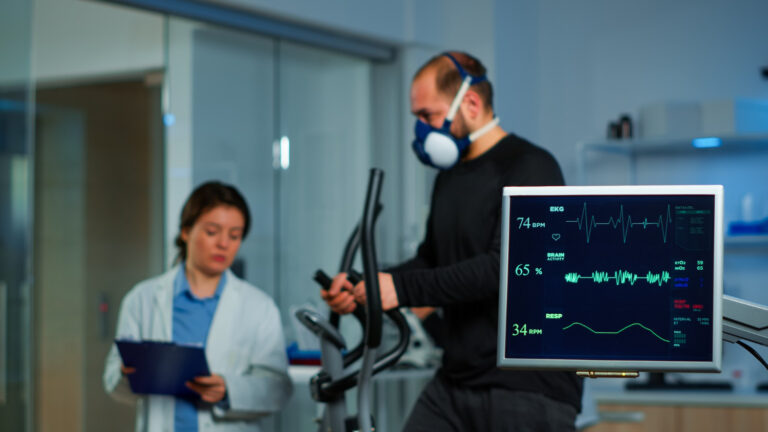Concussion and heart rate
Its Maybe Sound Familiar:
you wake up from a relaxing nap or expecting to feel that your mind and body is refreshed, but instead, your heart is pounding for no reason. Or you stand up after a few hours on the couch and feel lightheaded and unstable. Maybe your resting heart rate is now up to 80-90, even though it used to be 65.
Mostly people don’t know that a concussion can cause changes in your heart behaviors, so the symptoms catch them off guard. But that is something very true. Your heart responds to stimuli from both your brain and your automatic nerves system. After a mild and serious brain injury concussion or other source of head trauma, those systems can send misleading signals to your heart that can cause some error in your system.
Any Head injury can affect your heart rate, including an overall increase or decrease in heart rate and body temp and lower and higher the heart rate variability how flexibly your heart rate adapts to situational changes that can cause some vibrating to your body and make you feel low and unexpected changes in your body.
I have been experienced with some patients whose post-concussion autonomic dysfunction led to cardiac infarction (heart attack) two week after injury, despite previously excellent cardiac health. His doctor couldn’t find any attributable cause except for his recent head injury.
At our clinic, we treat patients whose symptoms longer for months or years after a head injury or brain injury, a condition known as post-concussion syndrome that mostly cause because of brain or head injury
How a normal heart rate works

When healthy, the heart rate adapts rapidly to biological needs, coordinating with the brain through the autonomic nerves systems (ANS) pressure and chemical in the body to increase or decrease beats-per-minute (BPM) if you go for run, your limbs need more oxygen and nutrients from your blood so that heart beat faster to accommodate that need. When you rest, your heart rate should be slow and steady.heart rate and concussion
Your heart rate also responds to your emotions. If your friend or family person tap on your shoulder and startles you, your heart rate will increase spike in response as your part of your fight or suddenly response from your body which is the main function of healthy autonomic functions. When you realize there is no dangers, your heart should settle into its resting and making its normal and resting its quickly.
The autonomic nervous system plays a big role in these reactions that can really helps that can response faster and that other human can understand it easily. The ANS controls automatic processes in your body like blood pressure, heart rate breathing unless you have active your mind and think about it. digestion and more. Two parts of the ANS are the sympathetic nerves system (SNS) and parasympathetic nervous system (PNS)
The SNS is response for your fight to fight response while the PNS is in charge of rest of digest that will response your body with the emotion singles from your brain that how it reacts and how the things goings surrounding your body. That also measurers the ups and down rate of your heart part of the healthy and functions body
What Is Heart Rate Variability (HRV)?
Heart rate variability is how we describe the variation in time between each time heartbeat. In other words, it’s the variability in how long the heart takes to do an entire cycle between one moment to the next. The shortest the cycle the faster the pace. And then its is vice-versa. It is strongly recommended by the autonomic nervous system. A healthy heart has high HRV because its show the adaptability to the needs the needs of your body on the order of milliseconds and microseconds. A small HRV mean your heart is small flexible in its response to your body needs.
A Concussion often causes low heart rate variability all the indicting is control by the sympathetic nervous system. This means your heart has less flexibility to react in the moment and its connected to poorer concussion outcomes. At the Same stronger control by the sympathetic nervous system that your heart rate is spending more time at higher at rate control.
For example, lets’ say someone drops a glass and its shatters. Your heart rate spikes in response. When the SNS has a stronger influence over your heart than the PNS, it will take longer to settle back into your resting heart rate.
If you have low heart rate variability is often on indicator of poor health. And may even shorten your lifespan Some scientist think that every heart has a set number of beats before gives out. The extra wear and tear placed on your heart from LOW HRV and high SNS control can impact your health throughout your lifetime. Which is why it’s important to seek treatment
Can HRV Help Detect Concussion?
Medical exports are actively exploring the potential of Heart Rate Variability (HRV) as a diagnostic tool for acute concussions. although, studying HRV in this context poses significant challenges. Ideally, researchers would have access to both pre-concussion and post-concussion data to conduct a thorough investigation, but such comprehensive data is often unavailable. Key information required includes control data (such as patient age, sex, meal times, time spent sitting before measurements, existing mental health, etc.), extensive standardization, and prolonged monitoring times.
The intricate nature of HRV, influenced by numerous factors, adds complexity to the research process. Despite these challenges, a recent study demonstrated that a soccer player exhibited low HRV after a concussion, and this normalized along with the resolution of other concussion symptoms. However, the onset of low HRV took more than a week, rendering it too slow for immediate diagnosis. Nonetheless, with further research, sports medicine providers may consider HRV as one criterion for assessing when concussed athletes can safely return to play in the future.
The Effects of Concussion on Heart Rate

After researchers a concussion, there are many factors that can contribute to changes in your heart rate. One significant factor is dysautonomia, characterized by the dysregulation of the autonomic nervous system. In the majority of cases, dysautonomia manifests as the overactivation of the sympathetic nervous system (SNS). This overactivity can result in imbalanced signals reaching the heart, potentially giving rise to various symptoms heart rate concussion.
Here is a list of various potential reasons why you might experience changes in your heart rate after a head injury:
- Dysautonomia: Dysregulation of the autonomic nervous system.
- Increased sympathetic nervous system (SNS) activity.
- Vagal nerve dysfunction.
- Hormonal imbalances.
- Pain or discomfort associated with the head injury.
- Emotional stress and anxiety.
- Medication side effects.
- Changes in blood pressure.
- Intracranial pressure alterations.
- Impacts on the cardiovascular system due to the injury.
- Inflammation affecting the heart rate.
- Neurotransmitter imbalances.
- Physical exertion or activity.
- Presence of other underlying medical conditions.
- Response to environmental stimuli.
- Sleep disturbances.
- Blood sugar fluctuations.
- Respiratory issues.
- Postural changes affecting blood flow.
It’s important to note that these reasons can vary from person to person, and a thorough medical evaluation may be necessary to pinpoint the specific factors contributing to heart rate changes after a head injury.
Can a Concussion Cause Heart Rate Increase or Decrease?
Yes surely. It’s possible to observe changes in your baseline or resting heart rate following a head injury. An elevated resting heart rate may stem from the overactivation of the sympathetic nervous system. On the other hand, a lowered resting heart rate could result from an overreaction of the parasympathetic nervous system, influencing and slowing down the heart rate. These variations in baseline heart rate are indicative of the intricate interplay between the autonomic nervous system components and their response to the effects of a head injury.
Can Concussion Cause Heart Palpitations?
Yes, experiencing a concussion can indeed lead to heart palpitations, which involve sensations such as a stronger or irregular heartbeat. Patients often describe feeling like their heart is pounding in their chest without an apparent cause. This sensation is an indication that the heart is working harder than usual to pump blood.
An apt analogy is envisioning trying to expel water from a straw by blowing on one end. When there are no obstructions, the water flows out effortlessly. However, if you pinch the straw, you must exert more force to push the water through.
Similarly, when blood vessels are constricted, the heart has to exert more effort to pump blood through them. In some cases, these vessels constrict inappropriately due to incorrect signaling from the autonomic nervous system, leading to the sensation of a pounding heart until the issue is resolved.
Can Concussion Lead to POTS?
Mostly, a concussion has the potential to lead to POTS (postural orthostatic tachycardia syndrome). Individuals with POTS may experience lightheadedness, heart palpitations, or even fainting upon standing. This condition is characterized by an increase in heart rate (known as orthostatic tachycardia) when transitioning from a seated or lying position to standing. This elevated heart rate is the body’s compensatory response to counteract a drop-in blood pressure during positional changes.
POTS patients commonly encounter a range of symptoms affecting both cognitive and physical well-being, including anxiety, brain fog, blurry vision, sleep disturbances, and fatigue. Notably, these symptoms closely overlap with those associated with post-concussion syndrome. If a person is diagnosed with POTS following a head injury, it is likely that the head injury is the underlying cause and can be addressed through appropriate treatment.
Treatment for Persistent Post-Concussion Symptom
If you’re feeling different after a brain injury, it’s important to find out why. At Cognitive, we use a special scan to look at how blood flows in your brain. This helps us see which parts of your brain might not be working well. We also ask you about your symptoms and check you physically.
We give each person different therapies based on what they need. These therapies include exercises for muscles and brain, activities to help your body’s automatic functions, and more. We’ve found that these methods can be really helpful for people who’ve had a concussion.
If you’re having problems with your heart rate and how your body works, we use different techniques to help:
- We have exercises and activities to make your body’s automatic system work better.
- Breathing exercises can be useful.
- Learning to be calm and focused through meditation and mindfulness can make a difference.
- Talking with a psychologist might help if your emotions have changed since your injury.
- We use therapies that target certain parts of your brain to improve how your automatic system works.
- Listening to certain sounds between therapy sessions can help your nervous system.
- We have exercises that focus on the vague nerve, which is connected to the heart.







Thank you for your sharing. I am worried that I lack creative ideas. It is your article that makes me full of hope. Thank you. But, I have a question, can you help me?
sure how i can help you?